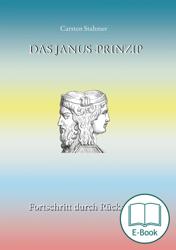The Roman god Janus can still be a role model for us today. His double look forwards and backwards teaches us that retrospection is also necessary for sustainable progress. Retrospection has a double meaning in this context: it describes looking back into the past as well as looking after his fellow human beings for strengthening social cohesion. For a more detailed description of the Janus principle, historians, philosophers and psychologists have their say, as do writers and artists. In addition, numerous illustrations, examples from novels, poems, fairy tales, films and songs illustrate the topic presented. In the last chapter of the book, Carsten Stahmer sets out concrete guidelines for a sustainable civil society without competitive pressure and state paternalism.
The Roman god Janus can still be a role model for us today. His double look forwards and backwards teaches us that retrospection is also necessary for sustainable progress. Retrospection has a double meaning in this context: it describes looking back into the past as well as looking after his fellow human beings for strengthening social cohesion. For a more detailed description of the Janus principle, historians, philosophers and psychologists have their say, as do writers and artists. In addition, numerous illustrations, examples from novels, poems, fairy tales, films and songs illustrate the topic presented. The first part of the book presents a wide variety of views on the question of whether human history has ultimately led to social progress. The second part describes reflections and well-considered retreats that could enable a new beginning with opportunities for progress. Finally, in the third and final part, it is examined whether there are approaches to strengthening the social cohesion of a society through mutual consideration and support. In the last chapter, Carsten Stahmer sets out concrete guidelines for a sustainable civil society without competitive pressure and state paternalism.
Professor Doctor Carsten Stahmer, born 1942, worked at the Federal Statistical Office in Wiesbaden and as an international expert, in China and Russia, for the United Nations and the Club of Rome; Lessons at Heidelberg University in economic and social statistics. Fields of work: Economic, environmental and socio-economic accounts, sustainability indicators, future models of a sustainable society. In 2019, Carsten Stahmer published the three-volume work on "Goethe in Wiesbaden 1814 and 1815" at Reichert Verlag. Further information on Stahmer's website:
www.carsten-stahmer.de.


 Preface
Preface